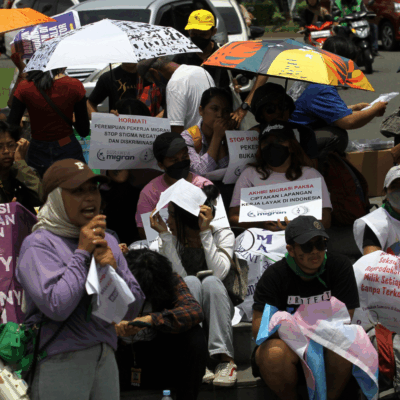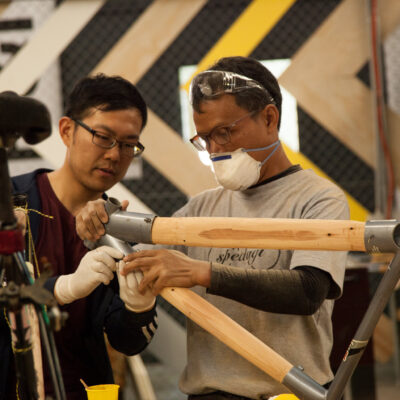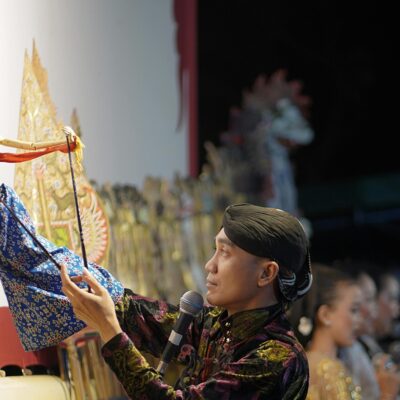In recent decades, China’s rise as a global economic and political force has sparked significant interest and scholarly inquiry worldwide. Understanding China’s multifaceted impact has become imperative not only for developed nations, which have traditionally spearheaded the study of China, but also for countries in the Global South, which have heightened engagement with China. As China assumes a more prominent role in international affairs, its policies, actions, and cultural influence reverberate globally, necessitating a deeper comprehension of its dynamics and implications.
Within this global context, Indonesia, as a significant player in the Global South, occupies a strategic position. The archipelagic nation boasts a rich tapestry of cultural, historical, and economic ties with China, spanning centuries. The contemporary landscape sees Indonesia navigating a complex relationship with China, marked by economic cooperation, geopolitical considerations, and cultural exchange. Against this backdrop, studies on contemporary China in Indonesia carry on added significance, serving as a critical lens through which to examine the construction of China knowledge outside of China.
We hope to shed light on the evolving nature of studies on contemporary China and its implications for Indonesia and the broader Global South. China Studies is an inherently fluid and contested field, but our analysis prioritises research focused specifically on contemporary China, which, as this article demonstrates, is often approached from state-centred and policy-driven perspectives. While we recognise the value of cultural, artistic, and diaspora studies, these fall outside the primary scope of this study because they tend to focus on how China is imagined, represented, or experienced in various contexts, rather than examining China itself as a political, economic, and strategic entity.
Dynamics and key knowledge producers in the study of contemporary China in Indonesia
The studies on contemporary China in Indonesia have been profoundly shaped by political, cultural, and academic dynamics. Indonesia’s interest in contemporary China can be traced back to the Sukarno era (1940s-1960s) when the new republic, born in the struggles that ended centuries of colonialism, exhibited significant interest towards the People’s Republic of China (PRC). In the 1950s and 1960s, the PRC expressed strong sympathy and support for the anti-imperialist and anti-colonialist struggles in Asia, Africa, and Latin America. During this period, some Indonesian scholars, often of Chinese-Indonesian descent, began studying the PRC, with institutions such as Universitas Indonesia emerging as leading research hubs.
During Indonesia’s New Order era (1966-1998), China Studies experienced a significant decline due to stringent government restrictions and political sensitivities. Under Suharto’s regime, all matters related to the PRC, including academic pursuits, were heavily restricted. Exceptions existed, though—for example, the Centre for Strategic and International Studies (CSIS) in Jakarta continued to conduct research related to China. Yet, public knowledge about China was limited in Indonesia during Suharto’s regime.
Era Reformasi (post-1998) marked a significant turning point, characterised by an influx of information about China spurred by its rising economic influence. A turning point came around 2000, after former Indonesian President Abdurrahman Wahid lifted restrictions on Chinese culture and language. This policy shift allowed China Studies in general—and research on the PRC in particular—to take off again in Indonesia. It was heavily driven by the ethnic Chinese community’s efforts to reconnect with their heritage. As a result, in the early days of the 21st century, Indonesia’s China Studies initially focused on language, literature, and culture rather than political, economic, or social perspectives.
The bilateral strategic partnership between Indonesia and China, established in 2005, further spurred interest in China-related studies in Indonesia, leading to a rise in the number of Indonesian scholars studying China. Two decades into its development, studies on contemporary China are now conducted by a diverse array of researchers in Indonesia’s universities, research institutions, and think tanks.
Indonesian universities have played a pivotal role in advancing the country’s knowledge of contemporary China. Universitas Indonesia stands out as a leading institution, maintaining a centre focused on China Studies even during the restrictive New Order period. This institution has continued to be a central hub for research and academic inquiry into China, fostering a tradition of scholarly engagement. Other universities have also contributed significantly to the field. For example, the ASEAN Studies Center at Universitas Gadjah Mada in Yogyakarta, though not primarily focused on China, has been active in engaging with China and shaping the construction of China-related knowledge in Indonesia. Maranatha University has a centre dedicated to studying the Chinese diaspora, examining the socio-cultural and economic contributions of Chinese Indonesians. Additionally, Confucius Institutes have a notable presence in nine Indonesian universities. Although they primarily focus on teaching the Chinese language and culture, some have been assisting in developing Indonesia’s understanding of China beyond this.
In addition to universities, research institutions, think tanks and informal networks have become active actors in studying contemporary China in Indonesia. The CSIS is a prominent example, conducting various studies related to China and contributing to policy-oriented research and analysis on China-Indonesia relations. The Habibie Center, a non-profit think tank founded by former Indonesian president B.J. Habibie, is also a major organisation actively engaged in research related to China and which also organises events and publishes reports on China. For example, the Centre held the second Jakarta Forum on ASEAN-China Relations in 2019. It published a report titled “Recent Developments in Cross-Strait Relations: US-China-Taiwan Triangular Relations and Potential Spillovers to Southeast Asia” in 2023. The Foreign Policy Community of Indonesia (FPCI), established by Dino Patti Djalal, a former senior Indonesian diplomat, is another influential entity. Although primarily an international relations student community, FPCI conducts important surveys and hosts discussions on perceptions of China in Indonesia and other Asian countries. Like Confucius Institutes, FPCI has a presence in many Indonesian universities, creating opportunities to network across institutions.
In addition, many smaller, less formal China knowledge networks are driven by the interests and initiatives of individual scholars and small groups. The Indonesia Sinology Forum, founded by Johannes Haryanto, is a notable example. It actively publishes reports and hosts seminars on various aspects of mainland China, Hong Kong, Macau, and Taiwan.
Knowledge production patterns on contemporary China in Indonesia
The burgeoning interest and expanding network of entities studying contemporary China have rapidly developed Indonesia’s China knowledge and research capacity. However, severe obstacles hinder more substantial development of the field. The New Order era of Suharto created a significant generational gap in China Studies expertise in Indonesia, which continues to limit the availability of experienced mentors and institutional memory. This limitation is further compounded by a lack of proficiency in the Chinese language among many local researchers, necessitating a heavy reliance on English-language sources. Consequently, this reliance may have limited the depth and originality of Indonesia’s knowledge production on contemporary China.
Despite the development of research institutions described in the previous section, the overall knowledge infrastructure for studying contemporary China remains underdeveloped in Indonesia. There is a notable absence of learned societies or specialised journals that could facilitate connections among researchers of contemporary China and provide platforms for publishing and disseminating their research. As a result, according to many of our Indonesian colleagues, the study of contemporary China—particularly from a social science perspective—has yet to emerge as a clearly defined academic discipline with a coherent scholarly identity.
Despite the escalating volume of China-related research in Indonesia, a considerable portion tends to be ad hoc rather than stemming from systematic, sustained scholarly efforts. Many researchers relegate China to a secondary subject within broader disciplinary research, treating it merely as a “case study” rather than a primary focus of scholarly inquiry. This pattern manifests in researchers producing only a few outputs on China, among many other non-China-related works. Nevertheless, a discernible set of researchers are highly productive in publishing academic works centred on contemporary China. While they may not necessarily be self-identified as China specialists, their empirical focus on contemporary China positions them as recognised experts within their academic circles.
Studies on contemporary China in Indonesia predominantly focus on issues directly impacting the nation. Notable topics include the South China Sea disputes, China’s Belt and Road Initiative, its soft power strategies, and the somewhat controversial presence of Confucius Institutes in Indonesia. Analyses often pivot around Indonesia’s responses or interpretations of these issues, occasionally intertwining discussions on the dynamics of China-US rivalry. Unsurprisingly, such analyses are predominantly the purview of scholars within the discipline of International Relations, who have emerged as primary producers of Indonesia’s knowledge of contemporary China. However, contributions from other disciplines, notably economics, are also evident. These studies delve into various topics, such as renminbi internationalisation and comparative analyses of China’s special economic zones with those of Indonesia.
Linked to the skewed focus on International Relations-related issues, prevailing research methodologies demonstrate a notable reliance on secondary data analysis, occasionally supplemented with primary data collection in Indonesia. On the contrary, primary data collection in the PRC remains rare, underscoring a critical gap in Indonesia’s current China scholarship. In essence, Indonesia-produced research on contemporary China tends to be more confined to presenting the “Indonesian perspective” on the PRC rather than exploring in-depth knowledge of China itself.
Publication outlets in the field consist of several main categories. In terms of conventional academic works, many research articles on contemporary China by Indonesian scholars are published in local or, more broadly, Asia-based journals. For example, many articles are published in the Indonesian Quarterly (hosted by CSIS), the Journal of ASEAN Studies (hosted by BINUS University), and Global Strategis (hosted by Airlangga University). China-related works have also appeared in journals such as the International Journal of China Studies, with its Editor-in-Chief based at Universiti Malaya, the China Quarterly of International Strategic Studies hosted by the Shanghai Institutes for International Studies, and Contemporary Chinese Political Economy and Strategic Relations hosted by the Institute of China and Asia-Pacific Studies at National Sun Yat-sen University in Taiwan.
Regarding academic books, commercial presses, including Routledge, Springer, and Singapore-based World Scientific Publishing, are the major publishers of China-related social science work involving Indonesia-based scholars. One specific category of works is edited volumes on China-related issues in Indonesia or the ASEAN region. Recent examples include Taiwan and Southeast Asia: Soft Power and Hard Truths Facing China’s Ascendancy (Routledge, 2023), Populism, Nationalism and South China Sea Dispute (Springer, 2022), The Belt and Road Initiative: ASEAN Countries’ Perspectives (World Scientific Publishing, 2019), Six Decades of Indonesia-China Relations (Springer, 2018), and Chinese Global Production Networks in ASEAN (Springer, 2016). Most of these works cover the broader ASEAN region, including one or two chapters from Indonesia, thereby involving Indonesia-based researchers. Indonesian presses, such as the Universitas Gadjah Mada and Airlangga University Press, have also published volumes with more local appeal. English monographs on contemporary China remain rare among Indonesia-based researchers, and these books are typically converted from PhD theses completed in Western academic institutions.
Beyond academic publications, many works are published as institutional reports or commentaries. CSIS and the Singapore-based ISEAS-Yusof Ishak Institute stand out as two key institutions actively publishing reports and commentaries related to China. Additionally, the Jakarta Post serves as a prominent local news outlet for China-related commentaries.
Contributions of Indonesian-based scholars
The current knowledge landscape of studies on contemporary China in Indonesia appears fragmented, lacking a cohesive identity and institutional framework. Despite ongoing efforts to expand scholarly engagement with China, the international visibility of Indonesia-produced knowledge of contemporary China remains limited, with few works finding their way into international top-tier journals or leading university presses. The gap is particularly critical in the Indonesian context as the university system already strongly incentivises researchers to publish in English, Scopus- or SSCI-indexed journals. According to many of our Indonesian colleagues, the underdevelopment of institutional knowledge infrastructure in the studies on contemporary China, such as the absence of a dedicated national learned society, is a key factor preventing the formation of a critical mass of contemporary China researchers and limiting opportunities for sustained intellectual exchange and collaboration. This challenge, in turn, hinders the nation’s ability to capitalise fully on its growing scholarly interest in contemporary China.
Nevertheless, Indonesian-based scholars have made unique contributions to the study of contemporary China. They have provided valuable insights into how China’s rise is perceived in Indonesia and its broader implications for the country. Their research contributes to the collective body of human knowledge on the strategic, economic, and cultural dimensions of China-Indonesia relations. It offers nuanced analyses that reflect Indonesia’s unique position in a changing global landscape, which tends to be increasingly dominated by the rivalry between China and the United States. For example, scholars have examined the BRI and its impacts on Indonesian infrastructure and economic policies, offering critical perspectives that challenge simplistic narratives. Additionally, Indonesian academics have delved into the socio-political implications of China’s influence in Indonesia, addressing public perception, cultural exchange, and educational collaboration. These efforts illuminate the multifaceted nature of Indonesia-China relations, contributing to a more comprehensive understanding of China’s global impact.
Western-centric knowledge production
Despite China’s increasing global influence, the studies on contemporary China in Indonesia remain heavily influenced by Western-centric paradigms, which dominate the knowledge production and dissemination in the field.
Historically, the development of China knowledge outside China has been deeply rooted in Western academic institutions. This Western-centric nature is evident in the frameworks and theories commonly employed to analyse China’s political, economic, and social phenomena, which often reflect the interests and priorities in Western societies. This Western-centric nature of studies on contemporary China is pronounced in today’s Indonesia. Indonesian scholars often rely on English-language literature and Western theoretical lenses, such as state-centric soft power, to understand and explain contemporary China and its policies. This reliance is partly due to the availability and accessibility of Western sources, often in English, a language more familiar to many Indonesian academics than Chinese.
Notably, English-speaking academic institutions, such as Australian universities, are pivotal in providing doctoral and master’s training to Indonesia-based China specialists. This factor has contributed to the prominence of Western-centric approaches within the field. A substantial number of Indonesia’s more prominent China experts have received their training in these institutions, reinforcing the dominance of Western perspectives and methodologies in Indonesia’s contemporary China scholarship. While this has helped integrate certain Indonesian scholarship into global academic networks, it may also risk producing a skewed representation of China—one that does not fully capture the complexities of contemporary China and its global interactions.
The dominance of Western-centric knowledge production has significant implications for the Global South, including Indonesia. As a result, Indonesian-based scholars are often at the periphery of English-language academic discourses on China. Worse still, according to many of our Indonesian colleagues, their capacity to produce China-related knowledge not directly tied to Indonesia is constrained by limited resources and a lack of opportunities to engage directly with Chinese scholars and institutions.
Western-centric knowledge production has also affected funding and publication opportunities for Indonesian-based China specialists, with higher-ranking journals and prestigious conferences often located in Western countries and primarily catering to Western audiences. This peripheral position impacts the development of local expertise and the ability to generate original perspectives on China. As a result, the knowledge produced about contemporary China in Indonesia often mirrors Western interests, not paying adequate attention to local nuances and the specific historical and cultural contexts of Indonesia-China relations. Consequently, the understanding of contemporary China within Indonesian academia has yet to reach its full potential.
As this article demonstrates, many Indonesia-based researchers are already making valuable contributions to the scholarship on contemporary China. At the same time, there remains considerable scope to further enrich this body of work by exploring alternative frameworks beyond dominant Western paradigms, engaging more deeply with Chinese-language sources and primary data from China, and fostering stronger academic exchange with scholars across Asia, including those based in China. These efforts, we believe, may open up new and locally grounded pathways for advancing the study of contemporary China in Indonesia.
Authors: A/Prof Yu Tao and Dr Xiao Tan.
Image: Pantjoran PIK Chinatown in North Jakarta. Credit: Yu Tao.




